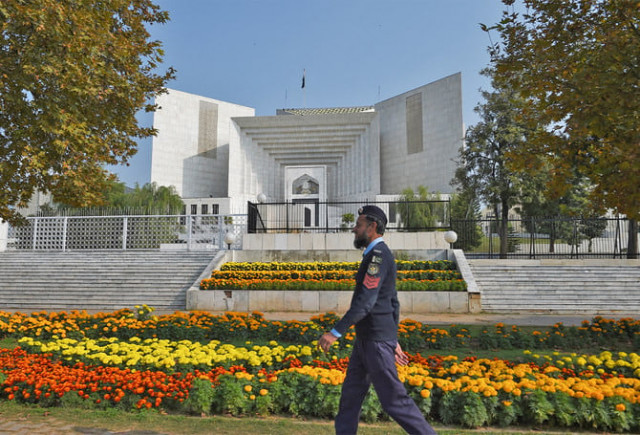Judges elevation to SC dominated judiciary
Events surrounding regime change also remained in focus

The dispute on the appointment of Supreme Court judges as well as events surrounding the regime change remained dominant in the judiciary in the year 2022.
Justice Umar Ata Bandial took oath as the chief justice of Pakistan (CJP) on February 1.
His biggest challenge was to evolve a consensus on the appointment of judges.
Five SC judges retired during the previous year.
However, CJP Bandial could not evolve a consensus as the Judicial Commission of Pakistan (JCP), which is a constitutional body to nominate the judges of the superior courts, remained divided on the elevation of high court judges to the apex court.
One section of the JCP, including the superior bars, kept on insisting that the seniority principle should be followed while appointing SC judges.
The other section, led by CJP Bandial, gave preference to other aspects including merit and competency for the elevation of judges to the SC.
The apex court is still short of two judges because of this deadlock.
The majority of the JCP members did not approve the CJP's four nominees for their elevation to the SC on July 28.
Later, CJP Bandial made public the audio recording of the JCP proceeding wherein the conflict among senior SC judges was evident.
SC Senior Puisne Judge Justice Qazi Faez Isa, who is a member of the JCP, wrote several letters to the CJP, raising his objections over the process for the appointment of apex court judges.
After nine months of the deadlock, the JCP, with the majority of members, on October 24 approved the elevation of three judges to the SC.
They included Islamabad High Court Chief Justice Athar Minallah as well as two junior judges of high courts.
Both federal government representatives in the JCP — the law minister and attorney general for Pakistan — also endorsed these nominations.
It was witnessed that the situation became worse in the Sindh High Court because of the junior judges' elevation to the SC.
There was frustration among senior SHC judges, who were overlooked for their appointment to the apex court.
The SC also played a pivotal role in the regime change in the month of April.
The CJP Bandial-led SC took up a petition filed by the Supreme Court Bar Association (SCBA) for completing the process of the vote of no-confidence motion against the then prime minister, Imran Khan, under Article 95 of the Constitution.
When the then National Assembly deputy speaker, Qasim Suri, rejected the no-trust resolution against Imran, the apex court initiated suo motu proceedings and declared his ruling as void.
The court then bound the NA speaker to complete the process of the no-confidence motion.
The SC as well as the IHC were opened at night, when the NA speaker was delaying the process.
However, the PTI leadership severely criticised these judges to open the courts at night.
Following this criticism, the SC had announced its opinion on the interpretation and scope of Article 63 (A) of the Constitution.
The same larger bench, with a majority of three to two, had held that the vote of a defecting lawmaker in violation of Article 63 (A) could not be counted.
Most lawyers strongly objected to this interpretation by saying that it was tantamount to “re-writing” the Constitution.
Even senior lawyers termed it as the worst judgment of the year 2022.
Likewise, when then Punjab Assembly deputy speaker Dost Muhammad Mazari had rejected 10 PML-Q votes during the election for the new chief minister, the SC entertained incumbent CM Parvez Elahi’s petition at its Lahore Registry at night.
The coalition government led by the PML-N along with SCBA representatives requested the SC to form a full court to hear the case.
However, their plea was rejected by a special bench, led by CJP Bandial, and comprising Justice Ijazul Ahsan and Justice Munib Akhtar.
All respondents related to the federal government decided to boycott the judicial proceedings.
This caused an embarrassment for the judiciary.
Subsequently, the SC held that the deputy speaker’s ruling to reject 10 PML-Q MPAs' votes was unconstitutional.
The court also declared petitioner Elahi as the new chief minister of Punjab.
Senior lawyers said though the judgment was correct, but it should have been given by a larger bench.
After the regime change, the PTI filed several constitution petitions on different issues including the amendments to the National Accountability Ordinance (NAO), overseas Pakistanis’ right to vote, surveillance of top government functionaries etc.
These matters are still pending.
When the federal government refused to allow the PTI to hold a sit-in at Islamabad’s D-Chowk, an SC bench, led by Justice Ijazul Ahsan, intervened.
He directed the federal government authorities to provide an alternate place to the PTI for holding a rally in the federal capital.
However, the May 25 order was violated by PTI leaders and activists when they reached D-Chowk in any case.
The interior ministry moved an application for initiating contempt proceeding against the PTI chief.
The matter is still pending as four members of the larger bench could not find enough material so far for the issuance of a contempt notice to Imran.
The SC also took suo motu notice of the alleged interference of the executive in the affairs of investigation as well as prosecution in high-profile corruption cases against top government functionaries. This matter is also pending.
The apex court declared the settlement on the Reko Diq project as legal.
The court also set aside the lifetime disqualification of PTI lawmaker Faisal Vawda.
Vawda was disqualified on account of holding dual nationality at the time of the 2018 general elections.
PTI leaders are continuously criticising the apex court for not protecting the “fundamental rights” of citizens in the matters wherein the interests of the powerful circles were involved.
Likewise, one section of lawmakers and rights activists is raising questions about why MNA Ali Wazir is not being released so far.
They are also wondering why the SC did not “rescue” PTI Senator Azam Swati as he was being victimised by the State and his privacy was violated as well.
Likewise, no suo motu was taken on the alleged custodial torture of PTI leader Shahbaz Gill.
The SC also did not entertain the PTI chief’s plea on the registration of an FIR over the attack on him in Punjab's Wazirabad as per his desire.
However, CJP Bandial has taken suo motu notice of the killing of journalist Arshad Sharif in Kenya.
A special joint investigation team (JIT) has been formed to probe into the matter. A larger bench of the SC will resume the hearing of the case in the first week of January.
Despite lacking full strength, the SC, led by CJP Bandial, remained successful in reducing the number of pending cases last year.
A discipline is being witnessed in the composition of benches as well as fixation of cases during CJP Bandial’s tenure.
According to an SC statement, data by the end of autumn in 2022 showed a reduction in the number of pending cases by a figure of 2,653.
Commenting about the apex court’s performance in 2022, former additional attorney general Tariq Mahmood Khokhar said not all judges accepted the ways of the CJP.
He added that they resented the non-holding of full court meetings, constitution of benches, de-facto exclusion of senior judiciary from important cases and appointment of SC judges against the seniority principle.
The top court faces immense challenges in the new year.
There is a need to regulate the CJP's discretionary powers to ensure more transparency on judges' appointments, composition of benches, fixation of cases, etc.
No full court meeting has been held for the last three years.
Consensus-based appointments should be made to the top court.
The perception that a majority of like-minded judges are being included in the larger or special benches to hear high-profile cases must be ended.
The SC judges should also end the perception that they were being influenced by 'powerful circles' in political or sensitive matters.



















COMMENTS
Comments are moderated and generally will be posted if they are on-topic and not abusive.
For more information, please see our Comments FAQ